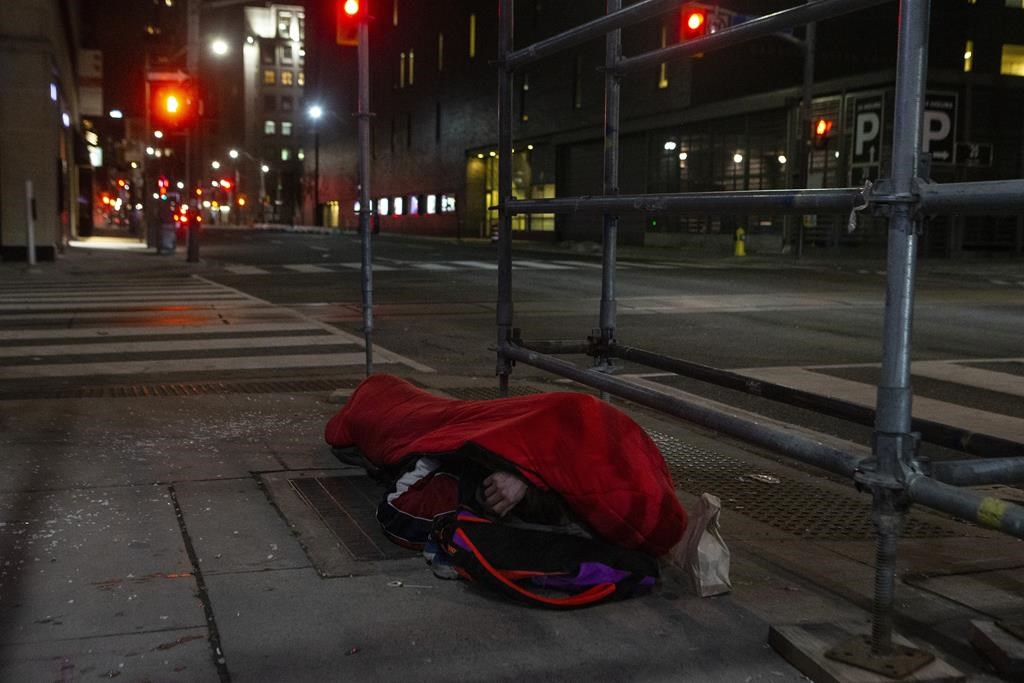TORONTO — With a week to go before homeless residents have to leave a Toronto hotel-turned-shelter, some say they don’t know where they’ll end up once they have to move out while advocates say the timing means many could be left to fend for themselves in the cold.
The shelter site at what was formerly the Novotel Hotel Centre in downtown Toronto was leased by the city after the pandemic hit.
The city began using hotels for those experiencing homelessness after hundreds fled shelters in March 2020 for fear of contracting COVID-19. The hotels offered an alternative to encampments that cropped up in parks and allowed additional space for physical distancing.
Now, however, the property owner of the Novotel site intends to convert the venue back to a hotel in the new year, the city said. Residents were given notice that they had to relocate by Dec. 6, with the city saying it was working with them to find other shelters or permanent housing.
But individuals who live at the site, as well as those who work with them, say not all residents have been able to find alternative housing ahead of the deadline.
“I’m really, really scared. Right now there’s no plan in place,” said Betty Ames, who has been staying at the Novotel shelter for six months.
“I don’t want to be outside, it was not in my plan.”
Ames, who works as an overdose prevention worker, said she can’t go into a congregate shelter setting because of a heart condition that could put her health at risk. She said she had been offered an apartment at one point but wasn’t allowed to view it before signing a lease so she refused. She said she’s since been trying to secure housing on her own to no avail.
If she can’t find somewhere safe to go by Dec. 6, Ames will likely pitch a tent outside.
“I’m full of fear,” she said. “I have to fight off tears at least 100 times a day.”
The Novotel shelter hotel housed approximately 260 people in individual rooms at the height of its operations, according to the city. As of Nov. 22, there were 78 people still living at the site.
The city said it had been working to relocate the site’s residents since Oct. 11. Nine have moved to permanent housing since the site stopped taking new admissions in October and another 33 have housing plans in place, the city said. If housing isn’t available or doesn’t meet a resident’s medical needs, they will be placed in alternative shelters, the city said.
“The intent is to find an appropriate referral for everyone prior to December 6, which could include transition to permanent housing or a move to another shelter,” said city spokesperson Erin Whitton.
“The most important thing is continuing to provide safe, indoor shelter where people have continuous access to needed wraparound supports and a housing worker.”
But some are firmly against the planned closure of the Novotel site.
A video circulating online that was taken last week appears to show one resident being carried out by police officers. Community worker Sid Jackson, who filmed the video and worked with the resident, said the woman was frustrated by not being able to meet with a housing worker and refused to leave.
The woman was taken to another shelter hotel, Jackson said, noting that most shelter hotels have had their operations extended until April 2023.
“They’ve just decided to close this hotel and it’s just chaos,” said Jackson. “It’s been really heartbreaking because we’ve been down there at the Novotel and people are crying, they’re just like … ‘Our friends are going to die, I might die.'”
The city said it could not comment on individual cases but said no resident has been forcibly moved off-site due to a relocation. It also said police may be called if staff are concerned for the well-being of a client or the safety of staff.
According to data from the city’s central intake team, an average of 187 daily callers could not be matched with a shelter space in October.
Rafi Aaron, a spokesperson for the Interfaith Coalition to Fight Homelessness, said those figures could be even higher as some experiencing homelessness no longer try to secure a place to stay.
“To start closing anything at this point, when you’re turning people away, is just a recipe for disaster,” said Aaron, who said he’s never seen so many people “out on the streets sleeping rough” in his 15 years volunteering in the sector.
“We will set records for hypothermia, for amputation of limbs … if something doesn’t change.”
Gord Tanner, manager of Toronto’s Shelter, Support and Housing Administration, has said the shelter system accommodates approximately 8,200 people per night — 1,600 more people per night than this time last year — and is at capacity most nights.
The City of Toronto said it’s creating more than 1,000 new housing spaces for the winter, including 400 new affordable homes and 230 additional spaces in the existing shelter system.
It also plans to create an additional 500 shelter beds by moving beds closer together – from two metres apart to 1.25 metres – in a move that goes against a recommendation from infection prevention and control specialists the city worked with.
Lorraine Lam, a community worker and advocate with the Shelter and Housing Justice Network, said that move is problematic given respiratory illnesses still going around.
She said the Novotel shelter’s closing will mean more people on the streets, in encampments and riding transit to stay warm if they don’t feel they have safe housing options.
“It’s far from a plan, especially since we’re in the middle of winter right now,” she said. “It’s really inhumane.”
This report by The Canadian Press was first published Nov. 30, 2022.
———
This story was produced with the financial assistance of the Meta and Canadian Press News Fellowship.


